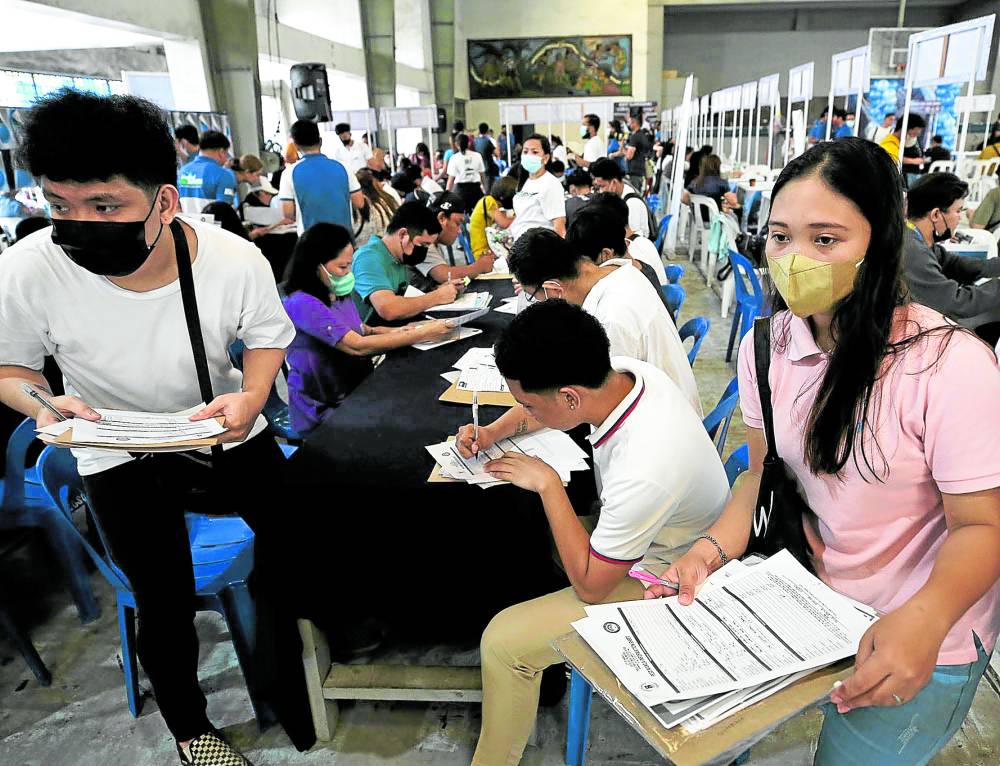
JOB FAIR Applicants fill up forms at the Public Employment Service Office in Manila on Feb. 24 . —RICHARD A. REYES
Tens of millions of Filipinos are expected to join the country’s workforce this year, competing for jobs in a world vastly changed by the pandemic and made more challenging by headwinds brought by a global recession.
Maica Aquinde, 23, who graduated with a marketing degree from a well-known university in Metro Manila in September 2022, is one of them. Despite being a college graduate, she is having trouble finding work.
Anxiety is her frequent visitor, as the pressure to find a suitable work—one that pays well and gives fulfillment—is escalating several months after graduation.
“I didn’t think it would be this hard to find a job I like. I’ve sent out some applications already. But so far, none have seemed to push through,” she says with a grimace on her face, struggling to understand why it is taking her so long to find suitable employment.
Aquinde admits that it’s time to take online courses to enhance her resume, seeing it as a move to somehow address the figurative wall she has yet to hurdle.
Amid this economic and social backdrop, business-focused social media platform LinkedIn lists the 10 most sought-after skills in today’s working environment.
LinkedIn cites this list in its Workplace Learning Report 2023, which is based on paid job postings on its site.The list also took cues from the standout skills of professionals on the site who have received a message from a recruiter or were hired in the past six months.
The top five are: customer service, management, communications, sales and analytical skills.
Project management, leadership, English language skill, research and marketing were also cited in the same list.
Hard vs. soft skills
The list includes both soft and hard skills. Soft skills involve interpersonal skills and communicating with people while hard skills refer to the ability to take on specific job tasks.
“To remain agile and resilient in the fast-evolving business environment, companies are prioritizing soft skills to help their workforce navigate complex work situations, build relationships and achieve results,” LinkedIn says.
“Other skills to handle diverse people and situations are highly sought-after as well. Hard skills such as research and marketing round up the list of skills that can help professionals stand out, and for businesses to navigate and thrive in this environment,” it adds.
LinkedIn says that the COVID-19 pandemic has caused shockwaves in workplace trends, leading to talent disruption, inflation, skills shortages and global tension.
The report says that skill sets for jobs have changed by around 25 percent since 2015 and the variance is expected to double by 2027.
To adapt to this challenge, LinkedIn suggests that a culture of constant learning should be normalized in the workplace.
L&D: Staying agile
LinkedIn says that more companies in Southeast Asia, including in the Philippines, are investing in learning and development (L&D) to stay agile and ensure their workforce is ready to take advantage of opportunities.
“Investment in L&D is an increasing national focus in the Philippines, as the new GoDigital Pilipinas initiative aims to promote the development of digital literacy, including entrepreneurship and innovation, in the country,” LinkedIn says.
“Opportunities for continuous learning have also become table stakes for professionals in response to constant change from tech disruption and a volatile job market,” it notes.
In the same report, Linkedin says that 93 percent of organizations are concerned about employee retention, with many of them struggling with employee turnover in the wake of the pandemic.
“And even while some layoffs have made headlines in recent months, talent development professionals continue to grapple with skills shortages and turnover risk for critical talent,” it says.
People who are not given the opportunity to learn will leave, LinkedIn warns, noting that three of the top five factors that drive people to pursue new jobs reflect their desire to stretch, grow and develop new skills.